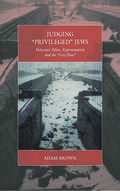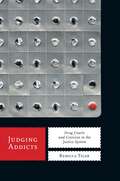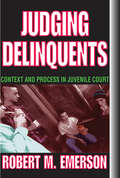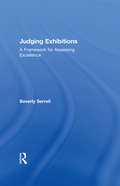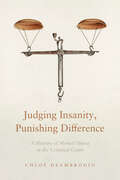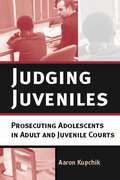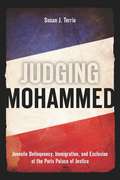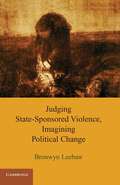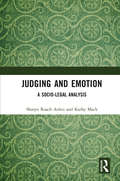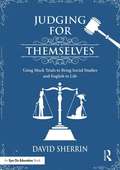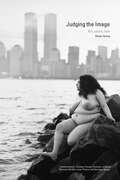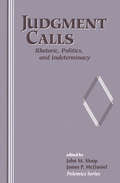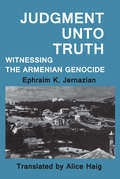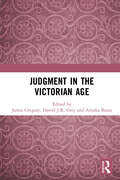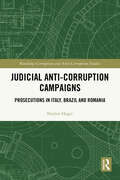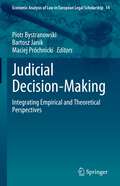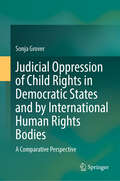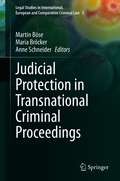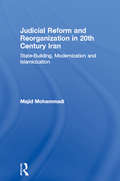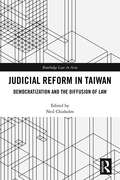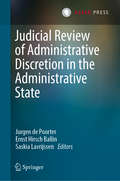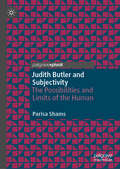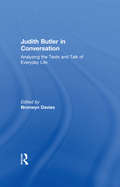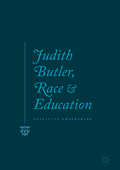- Table View
- List View
Judging 'Privileged' Jews
by Adam BrownThe Nazis' persecution of the Jews during the Holocaust included the creation of prisoner hierarchies that forced victims to cooperate with their persecutors. Many in the camps and ghettos came to hold so-called "privileged" positions, and their behavior has often been judged as self-serving and harmful to fellow inmates. Such controversial figures constitute an intrinsically important, frequently misunderstood, and often taboo aspect of the Holocaust. Drawing on Primo Levi's concept of the "grey zone," this study analyzes the passing of moral judgment on "privileged" Jews as represented by writers, such as Raul Hilberg, and in films, including Claude Lanzmann's Shoah and Steven Spielberg's Schindler's List. Negotiating the problems and potentialities of "representing the unrepresentable," this book engages with issues that are fundamental to present-day attempts to understand the Holocaust and deeply relevant to reflections on human nature.
Judging Addicts: Drug Courts and Coercion in the Justice System (Alternative Criminology #6)
by Rebecca TigerThe number of people incarcerated in the U.S. now exceeds 2.3 million, due in part to the increasing criminalization of drug use: over 25% of people incarcerated in jails and prisons are there for drug offenses. Judging Addicts examines this increased criminalization of drugs and the medicalization of addiction in the U.S. by focusing on drug courts, where defendants are sent to drug treatment instead of prison. Rebecca Tiger explores how advocates of these courts make their case for what they call “enlightened coercion,” detailing how they use medical theories of addiction to justify increased criminal justice oversight of defendants who, through this process, are defined as both “sick” and “bad.” Tiger shows how these courts fuse punitive and therapeutic approaches to drug use in the name of a “progressive” and “enlightened” approach to addiction. She critiques the medicalization of drug users, showing how the disease designation can complement, rather than contradict, punitive approaches, demonstrating that these courts are neither unprecedented nor unique, and that they contain great potential to expand punitive control over drug users. Tiger argues that the medicalization of addiction has done little to stem the punishment of drug users because of a key conceptual overlap in the medical and punitive approaches—that habitual drug use is a problem that needs to be fixed through sobriety. Judging Addicts presses policymakers to implement humane responses to persistent substance use that remove its control entirely from the criminal justice system and ultimately explores the nature of crime and punishment in the U.S. today.
Judging Delinquents: Context and Process in Juvenile Court
by Robert M. EmersonJuvenile court has elicited the interest and criticism of lawyers, social workers, and criminologists, but less attention from sociologists. This book adds to growing sociological literature on the operations of legal institutions. It describes some critical aspects of the functioning of the juvenile court, an institution charged with judging and treating delinquents. To this end, it analyzes the nature of the court operation, the handling of delinquents, and the court's functions in relation to the wider social and legal system.
Judging Exhibitions: A Framework for Assessing Excellence
by Beverly SerrellRenowned museum consultant and researcher Beverly Serrell and a group of museum professionals from the Chicago area have developed a generalizable framework by which the quality of museum exhibitions can be judged from a visitor-centered perspective. Using criteria such as comfort, engagement, reinforcement, and meaningfulness, they have produced a useful tool for other museum professionals to better assess the effectiveness of museum exhibitions and thereby to improve their quality. An attached CD includes a brief video demonstrating the Excellent Judges process and provides additional illustrations and information for the reader. Tested in a dozen institutions by the research team, this step-by-step approach to judging exhibitions will be of great value to museum directors, exhibit developers, and other museum professionals.
Judging Insanity, Punishing Difference: A History of Mental Illness in the Criminal Court (The Cultural Lives of Law)
by Chloé DeambrogioIn Judging Insanity, Punishing Difference, Chloé Deambrogio explores how developments in the field of forensic psychiatry shaped American courts' assessments of defendants' mental health and criminal responsibility over the course of the twentieth century. During this period, new psychiatric notions of the mind and its readability, legal doctrines of insanity and diminished culpability, and cultural stereotypes about race and gender shaped the ways in which legal professionals, mental health experts, and lay witnesses approached mental disability evidence, especially in cases carrying the death penalty. Using Texas as a case study, Deambrogio examines how these medical, legal, and cultural trends shaped psycho-legal debates in state criminal courts, while shedding light on the ways in which experts and lay actors' interpretations of "pathological" mental states influenced trial verdicts in capital cases. She shows that despite mounting pressures from advocates of the "rehabilitative penology," Texas courts maintained a punitive approach towards defendants allegedly affected by severe mental disabilities, while allowing for moralized views about personalities, habits, and lifestyle to influence psycho-legal assessments, in potentially prejudicial ways.
Judging Juveniles: Prosecuting Adolescents in Adult and Juvenile Courts (New Perspectives in Crime, Deviance, and Law #5)
by Aaron Kupchik2007 Ruth Shonle Cavan Young Scholar Award presented by the American Society of Criminology2007 American Society of Criminology Michael J. Hindelang Award for the Most Outstanding Contribution to Research in CriminologyBy comparing how adolescents are prosecuted and punished in juvenile and criminal (adult) courts, Aaron Kupchik finds that prosecuting adolescents in criminal court does not fit with our cultural understandings of youthfulness. As a result, adolescents who are transferred to criminal courts are still judged as juveniles. Ultimately, Kupchik makes a compelling argument for the suitability of juvenile courts in treating adolescents. Judging Juveniles suggests that justice would be better served if adolescents were handled by the system designed to address their special needs.
Judging Mohammed
by Susan J. TerrioBy having her research plan formally accepted by the French ministry of Justice, Terrio (anthropology, Georgetown U. , US) was permitted to observe the juvenile court proceedings and to interview accused youth, their families, and court officials, all of which is ordinarily forbidden to the public. Noting that almost all the youth brought before the court were immigrants, she explores such topics as whether They are all delinquents, historical and contemporary representations of juvenile delinquency, getting arrested and going to court, rendering justice in chambers, judging delinquents in the juvenile courts, and the problem of undocumented minors. Annotation ©2009 Book News, Inc. , Portland, OR (booknews. com)
Judging State-Sponsored Violence, Imagining Political Change
by Bronwyn Anne LeebawHow should state-sponsored atrocities be judged and remembered? This controversial question animates contemporary debates on transitional justice and reconciliation. This book reconsiders the legacies of two institutions that transformed the theory and practice of transitional justice. Whereas the Nuremberg Trials exemplified the promise of legalism and international criminal justice, South Africa's Truth and Reconciliation Commission promoted restorative justice and truth commissions. Leebaw argues that the two frameworks share a common problem: both rely on criminal justice strategies to investigate experiences of individual victims and perpetrators, which undermines their critical role as responses to systematic atrocities. Drawing on the work of influential transitional justice institutions and thinkers such as Judith Shklar, Hannah Arendt, José Zalaquett and Desmond Tutu, Leebaw offers a new approach to thinking about the critical role of transitional justice - one that emphasizes the importance of political judgment and investigations that examine complicity in, and resistance to, systematic atrocities.
Judging and Emotion: A Socio-Legal Analysis
by Kathy Mack Sharyn Roach AnleuJudges embody impartial legal authority. They are the nexus between formal abstract law, the legal institution of the court, and the practical tasks of making and communicating decisions. Because emotions are often viewed as inherently irrational, disorderly, impulsive and personal, and therefore inconsistent with the impartiality required for a legitimate exercise of judicial authority, judging is usually understood to be unemotional. This conventional model of judging emphasises reason over feeling and legal rules over emotion. But, despite these powerful expectations of judicial dispassion and detachment, emotions and emotional capacities are inevitably part of judging and courtroom practice. This book addresses the place of emotion in judicial work. Grounded in empirical data – interviews, observations and surveys – it investigates how judicial officers understand, experience, deploy, display and manage emotions as part of their everyday work, especially in court. Building on a growing interest in emotions – in law and elsewhere – the book offers a much-needed empirical examination of the relationship between judging and emotion, as it considers how tensions between the demand for emotional engagement and the obligation of constraint are managed at the level of the individual judicial officer, and institutionally.
Judging for Themselves: Using Mock Trials to Bring Social Studies and English to Life
by David SherrinLearn how to use mock trials to bring history and literature to life! When students take on the roles of lawyers and witnesses in historical or literary trials, they develop greater investment in the topics, they learn rigorous close-reading and questioning techniques, and they are able to deeply explore and reflect upon themes of justice and responsibility. In this new book from award-winning teacher David Sherrin, you#65533;ll find out how this lively instructional strategy will make learning a more immersive, engaging, and memorable experience for your middle school and high school students. The book includes: a clear how-to guide to get the most out of mock trials in your class; ready-made units and lessons to get you started right away, complete with sample scripts, primary source documents, scaffolding worksheets, and assessment rubrics; templates and step-by-step instructions to help you design your own mock trials. The pre-made units, which Sherrin spent years refining in his classroom, cover historical topics such as the Nuremberg Trials and the inquisitions of Martin Luther and Galileo. You#65533;ll also find fun and interactive mock trials based on the literary works The Pearl and To Kill a Mockingbird. These lessons will help students at all ability levels to become better readers, public speakers, and critical thinkers. For even more engaging lessons, try out Sherrin#65533;s companion book on role-plays, The Classes They Remember: Using Role-Plays to Bring Social Studies and English to Life.
Judging the Image: Art, Value, Law (Transformations)
by Alison YoungArt, value, law - the links between these three terms mark a history of struggle in the cultural scene. Studies of contemporary culture have thus increasingly turned to the image as central to the production of legitimacy, aesthetics and order. Judging the Image extends the cultural turn in legal and criminological studies by interrogating our responses to the image. This book provides a space to think through problems of ethics, social authority and the legal imagination. Concepts of memory and interpretation, violence and aesthetic, authority and legitimacy are considered in a diverse range of sites, including:* body, performance and regulation * judgment, censorship and controversial artworks* graffiti and the aesthetics of public space* HIV and the art of the disappearing body* witnessing, ethics and the performance of suffering* memorial images - art in the wake of disaster.
Judgment Calls: Rhetoric, Politics, And Indeterminacy
by John SloopThe concept of judgment has occupied a place of special importance in the tradition of Western thought. In antiquity and especially in the Enlightenment, judgment served as the rubric under which Western thinkers struggled to come to terms with how the world of human concerns is constituted in thought and, perhaps more important, how humans call for timely and appropriate actions. Recently, judgment has again emerged as a highly contestatory site for philosophical, rhetorical, and cultural reflection and inquiry.This book puts into contact a variety of responses to the question of judgment in a postmodern age, seeking out the question of how, once solid ground is pulled out from underneath the position of the judge, one continues to ?tread? judgment, to meet obligations while remaining afloat.The essays in this edited volume investigate judgment as a rhetorical problem to be discussed philosophically and examines the standards by which judgments are made and can be made in contemporary culture. The essays clarify the links between rhetoric and judgment as they are played out on public and meta-critical levels.
Judgment Unto Truth: Witnessing the Armenian Genocide
by Hugh DaunceyThis dramatic personal narrative is a unique contribution to understanding past and current events in the Near East. These memoirs of an American Protestant clergyman reveal little known aspects of major events in Asia Minor in the early twentieth century, give valuable insights to their background, and describe pivotal interrelationships with the western world. Those perceptions are woven into the story of the author's protracted genocidal experiences. Dispassionately rendered, Judgment Unto Truth is a call for truth and justice.In the Hamidian massacres of 1895. Jernazian, a five-year orphan, loses two brothers. When all the Armenian Protestant clergy of Cilicia are killed in the Young Turks' "Adana massacre" of 1909, Jernazian answers the call to replenish the vacant pulpits. In 1915, when the "final solution to the Armenian question" is in progress, the author, an interpreter of the Turkish government, is in a unique position to observe the genocidal process. Afterwards, he and his new bride work to rehabilitate destitute survivors. He serves as liaison and advisor during the British and French occupations (1919-21). And during the Kemalist revolution (1921-23), Jernazian loses his remaining family and nearly his own life. Only through a miraculous escape after twenty-one months in a Turkish prison is he reunited with his wife, her mother, a daughter, and a son born three months after his arrest.An unusual blend of religious idealism and pragmatic politics, his memoirs provide a singular emotional experience. As Vahakn Dadrian observes in his Introduction, "This volume is a unique document of historical significanceaThe author presents comments and interpretations which portray him as an acute observer of intricate events." The book will appeal to historians of the period, educators, and professionals with an interest in the use and abuse of state power, and specialists interested in human behavior in extreme conditions.
Judgment in the Victorian Age
by James Gregory Annika Bautz Daniel J.R. GreyThis volume concerns judges, judgment and judgmentalism. It studies the Victorians as judges across a range of important fields, including the legal and aesthetic spheres, and within literature. It examines how various specialist forms of judgment were conceived and operated, and how the propensity to be judgmental was viewed.
Judgment under uncertainty: Heuristics and biases
by Daniel Kahneman Paul Slovic Amos TverskyThe thirty-five chapters in this book describe various judgmental heuristics and the biases they produce, not only in laboratory experiments but in important social, medical, and political situations as well. Individual chapters discuss the representativeness and availability heuristics, problems in judging covariation and control, overconfidence, multistage inference, social perception, medical diagnosis, risk perception, and methods for correcting and improving judgments under uncertainty. About half of the chapters are edited versions of classic articles; the remaining chapters are newly written for this book. Most review multiple studies or entire subareas of research and application rather than describing single experimental studies. This book will be useful to a wide range of students and researchers, as well as to decision makers seeking to gain insight into their judgments and to improve them.
Judicial Anti-Corruption Campaigns: Prosecutions in Italy, Brazil and Romania (Routledge Corruption and Anti-Corruption Studies)
by Nedim HogicThis book offers a comparative analysis of cases of mass prosecutions for political corruption in Italy, Brazil, and Romania.The book outlines how judicial showdowns with political corruption emerge, what consequences they create, and whether they can be considered legitimate judicial operations or coups orchestrated by political forces with the assistance of the judiciary. Due to the similarities exhibited in the legal, political, and economic spheres of the events, the book explores the Italian Mani Pulite, Brazilian Lava Jato, and Romanian judicial anti-corruption campaigns. These campaigns were simultaneously legal operations, narratives created by the media, and opportunities for the emergence of new political actors. The book demonstrates why judicial activity was a crucial tool for reducing and preventing corruption in these countries. In addition to investigating the key legal issues and narratives, the book explores the controversies of these campaigns and assesses whether they should be seen as judicial revolutions or cases of prosecutorial overreach.Providing a holistic comparative assessment of judicial means as a tool for controlling corruption, this book will be of interest to academics in the fields of Corruption Studies, Law, Development Studies, and Political Science.
Judicial Decision-Making: Integrating Empirical and Theoretical Perspectives (Economic Analysis of Law in European Legal Scholarship #14)
by Piotr Bystranowski Bartosz Janik Maciej PróchnickiThis book shares state-of-the-art insights on judicial decision-making from both theoretical and empirical perspectives. It offers in-depth coverage of the forefront of the field and reviews the most important issues and discussions connected with an empirical approach to judicial decision-making. It also addresses the challenges of judicial psychology to the ideal of rule of law and explores the promise and perils of applying artificial intelligence in law. In closing, it offers empirically-driven guidance on ways to improve the quality of legal reasoning.
Judicial Oppression of Child Rights in Democratic States and by International Human Rights Bodies: A Comparative Perspective
by Sonja GroverThe book analyzes in depth selected contemporary U.S., Canadian and European landmark and other cases illustrating the nature and impact of the legal regime that undermines child human rights empowerment in many Westerm democracies. The objectives in writing this book are to (i) encourage a re-evaluation of the legal regime that fosters the erosion of the notion of children as autonomous holders of fundamental human rights and not but subjects with weak derivative rights stemming from parental or family rights; (ii) highlight the courts‘ proper role in a democracy of protecting child and youth human rights empowerment and to (iii) contribute to fostering an evolution in the historical notion of the court’s patris patriae doctrine as including the protection and strengthening of child autonomous fundamental human rights and child empowerment. Ultimately then the book highlights through the child rights domain the significant role the courts must and should play in strengthening democratic values and principles.
Judicial Protection in Transnational Criminal Proceedings (Legal Studies in International, European and Comparative Criminal Law #5)
by Martin Böse Maria Bröcker Anne SchneiderThis book proposes and outlines a comprehensive framework for judicial protection in transnational criminal proceedings that ensures the right to judicial review without hampering the effective functioning of international cooperation in criminal matters. It examines a broad range of potential approaches in the context of selected national criminal justice systems, and offers a comparative analysis of EU Member States and non-Member States alike. The book particularly focuses on the differences between cooperation within the EU on the one hand and cooperation with third states on the other, and on the consequences of this distinction for the scope of judicial review.
Judicial Reform and Reorganization in 20th Century Iran: State-Building, Modernization and Islamicization (New Approaches in Sociology)
by Majid MohammadiIran is now at the center of political and social developments in the Middle East. This book examines the reform of the judicial system in 20th century Iran and is the first to relate state-building process with rule of law promotion and judicial reform in the region. This subject occupies the critical juncture of three developments in the contemporary study of Iranian society as an important and early case of social revolution and reform in the Middle East: the state-building process in a non-Western country throughout the 20th century, the incorporation of a non-Western Muslim country into the Western legal framework through codification and transplantation (1911-1979), and the Islamicization process after this critical social development and the Islamic Revolution of 1979. This exceptional study furthers our understanding of Iranian modern history as well as the democratization process, human rights and rule of law issues in the Middle East.
Judicial Reform in Taiwan: Democratization and the Diffusion of Law (Routledge Law in Asia)
by Neil ChisholmThis book examines Taiwan’s judicial reform process, which began three years after the 1996 transition to democracy, in 1999, when Taiwanese legal and political leaders began discussing how to reform Taiwan’s judicial system to meet the needs of the new social and political conditions. Covering different areas of the law in a comprehensive way, the book considers, for each legal area, problems related to rights and democracy in that field, the debates over reform, how foreign systems inspired reform proposals, the political process of change, and the substantive legal changes that ultimately emerged. The book also sets Taiwan’s legal reforms in their historical and comparative context, and discusses how the reform process continues to evolve.
Judicial Review of Administrative Discretion in the Administrative State
by Saskia Lavrijssen Ernst Hirsch Ballin Jurgen De PoorterThis book deals with one of the greatest challenges for the judiciary in the 21st century. It reflects on the judiciary’s role in reviewing administrative discretion in the administrative state; a role that can no longer solely be understood from the traditional doctrine of the Trias Politica.Traditionally, courts review acts of administrative bodies implying a degree of discretion with quite some restraint. Typically it is reviewed whether the decision is non-arbitrary or whether there is no manifest error of assessment. The question arises though as to whether the concern regarding ensuring the non-arbitrary character of the exercise of administrative power, which is frequently performed at a distance from political bodies, goes far enough to guarantee that the administration exercises its powers in a legitimate way.This publication searches for new modes of judicial review of administrative discretion exercised in the administrative state. It links state-of-the-art academic research on the role of courts in the administrative state with the daily practice of the higher and lower administrative courts struggling with their position in the evolving administrative state.The book concludes that with the changing role and forms of the administrative state, administrative courts across the world and across sectors are in the process of reconsidering their roles and the appropriate models of judicial review. Learning from the experiences in different sectors and jurisdictions, it provides theoretical and empirical foundations for reflecting on the advantages and disadvantages of different models of review, the constitutional consequences and the main questions that deserve further research and debate.Jurgen de Poorter is professor of administrative law at Tilburg University and deputy judge in the District Court of The Hague.Ernst Hirsch Ballin is distinguished university professor at Tilburg University, professor in human rights law at the University of Amsterdam, and president of the T.M.C. Asser Institute for International and European Law. He is also a member of the Scientific Council for Government policy (WRR).Saskia Lavrijssen is professor of Economic Regulation and Market Governance of Network Industries at Tilburg University.
Judith Butler and Subjectivity: The Possibilities and Limits of the Human
by Parisa ShamsThis book contextualises philosophy by bringing Judith Butler’s critique of identity into dialogue with an analysis of the transgressive self in dramatic literature. The author draws on Butler’s reflections on human agency and subjectivity to offer a fresh perspective for understanding the political and ethical stakes of identity as formed within a complex web of relations with human and non-human others. The book first positions a detailed analysis of Butler’s theory of subject formation within a broader framework of feminist philosophy and then incorporates examples and case studies from dramatic literature to argue that the subject is formed in relation to external forces, yet within its formation lies a space for transgressing the same environments and relations that condition the subject’s existence. By virtue of a fundamental dependency on conditions and relations that bring human beings into existence, they emerge as political and ethical agents capable of resisting the formative forces of power and responding – ethically – to the call of others.
Judith Butler in Conversation: Analyzing the Texts and Talk of Everyday Life
by Bronwyn DaviesHow has Judith Butler’s writing contributed to thought in the Social Sciences and the Humanities? The participants in this project draw on various aspects of Butler’s conceptual work and they question how it has opened up the possibilities of thought in areas of study as diverse as theatre studies, education and narrative therapy. In a format that demands careful listening and response, the scholars in this book interact with Butler, her writing, and each other. Within this dynamic space they take up Butler’s body of work and carry it in new and exciting directions. Their conversations and writing are, in turn, funny, exciting, surprising and moving.
Judith Butler, Race and Education
by Charlotte ChaddertonThis book provides an analysis of race and education through the lens of the work of Judith Butler. Although Butler tends to be best known in the field of education for her work on gender and sexuality, her work more broadly encompasses the functioning of power and hegemonic norms and the formation of subjects, and thus can also be applied to analyse issues of race. Applying a Butlerian framework to race allows us to question its ontological status, while considering it a hegemonic norm and a performative notion which has a significant impact on real lives. The author considers the implications of Butler’s thinking for debates; addressing diverse contemporary educational issues in which race continues to be (re)produced, such as the formation of leaner identities, the production of the good citizen, raising student aspirations, counter terrorism and surveillance in education, and qualitative research in education. This book will be of interest to students and scholars of education and race, the sociology of education and equality of opportunity.
